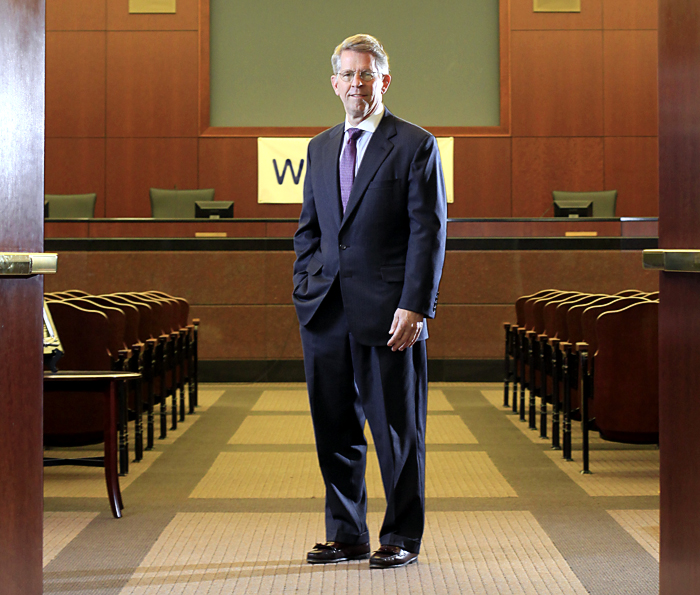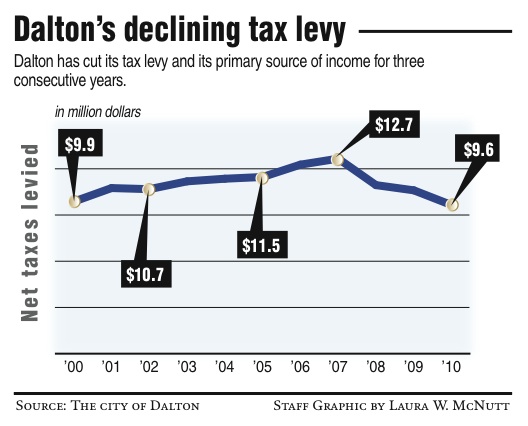DALTON, Ga. -- The City Charter in Dalton is designed to give the mayor limited powers.
The top elected official doesn't run the city day to day, and he votes only to break ties among the other four members of the City Council.
Some refer to the setup as a "weak mayor," but as his first term comes to a close, Dalton Mayor David Pennington has been anything but.
After his January 2008 election, the mayor led the City Council to cut spending by $1 million, eliminate nearly 30 city jobs and evict the Downtown Dalton Authority from City Hall amid a flap over how the entity derives its funding. All of that happened in Pennington's first eight months as mayor.
The mayor's image took such a bruising that year that some residents began referring to him as "King David" and at one point his wife asked, "Why did you take this job?"
The self-proclaimed "change agent" said he ran to fix the city's "spending issues," which he said plague government at all levels.
"Dalton had started getting down in the mouth, and people were saying our best days were behind us," Pennington said in a recent interview. "I just don't believe that. I knew one of our problems is that we are taxed to death."
Before deciding to run for mayor, he had seen Dalton's tax revenue rise from $9.9 million in 2000 to $12.7 million in 2007. Under his leadership, the tax levy has been reduced to $9.6 million, city records show.
In all, the city has cut taxes by 24 percent since Pennington took office. Most of that came through staffing reductions, benefits changes and elimination of some city services.
Pennington went after agencies that often are sacred cows, such as the fire and police departments. He reduced the police rolls from 107 to 95, cut $300,000 from the fire department budget and eliminated a costly pension plan for new hires.
The result has been an improved city financial picture and a lighter burden on taxpayers.
And it happened during the worst economic times in three decades, while the city of 33,000 residents is sitting on more than 1 million square feet of empty warehouse space and pockets of abandoned storefronts and vacated homes.
During Pennington's tenure, Dalton's bustling industrial economy, based mostly on floor coverings, closed plants and shed thousands of workers, creating the most prolonged spate of unemployment anyone can remember.
Over the past four years, one of every five jobs in Dalton has disappeared, swelling Dalton's unemployment rate at the end of 2010 to 12.7 percent -- the highest of any of Georgia's larger cities.
Since its peak in 2006, employment in metropolitan Dalton has declined by 20.3 percent, reducing the number of employed people in the area by 16,200.
Meanwhile other cities, such as Chattanooga, hiked taxes and created new fees to shore up funding gaps as plummeting home values starved city coffers of revenue.
And Pennington is not done yet. His ultimate goal, if he runs again, is to turn Dalton from one of the highest-taxing municipalities in Georgia to the largest city in the state without any property tax at all. The city levies about $9.6 million annually in property taxes. It also earns about $9 million in profits every year from Dalton Utilities, the city-owned power, water and natural gas company.
But the cuts have come at a cost. The city no longer performs its own road maintenance, trash is collected less often and there are fewer police on the streets.
Pennington insists that none of the cuts have affected the quality of life. Many residents say they agree.
Lawyer Ben Laughter served on the Downtown Dalton Authority when the mayor pushed for cuts to the authority.
Though the cuts drew criticism at first, Laughter said Pennington's view has held out as the economy worsened.
"I think the opinion of most people is that he should run again," Laughter said. "Now, given the economy, he looks very prescient in what he's done."
CUTS IN TOUGH TIMES
Cuts in hard times are nothing new. A survey of Georgia cities two years ago by Kennesaw State University researchers found that fewer than a third of Georgia municipalities increased spending in 2009 amid the worst of the great recession.
But Dr. Bill Baker, assistant professor of political science at Kennesaw State, said Dalton is unique in cutting both programs and taxes for three consecutive years.
"We're seeing cities cut programs across Georgia in a way that is longer and more severe than at any time in recent history," Baker said. "Cities have been asked for years to do more with less, but now many like Dalton are looking at maybe doing less with less. We've squeezed the turnip and there's nothing much more to squeeze."
Pennington went after the police, fire and recreation departments -- areas that are often immune to budget reductions. Those agencies had a combined $2 million in cuts in his first year in office.
In all, Pennington says he has cut what he called the city's outsized administrative staff by nearly 25 percent.
Dalton managed the cuts while growing its fund reserve by $6 million. It now has $19 million in a rainy-day fund -- roughly 75 percent of its annual operating costs, Pennington said.
Dalton's rosy financial picture contrasts sharply with that of Whitfield County, which struggled to pass a balanced budget in late December. Eventually, commissioners voted to pull $3 million from reserves and to ask employees to take four days without pay to offset the red ink.
But County Commission Chairman Mike Babb said the city still taxes at a much higher rate than the county, a point Pennington readily accepts.
"We're really comparing two governments on opposite ends of the spectrum," Babb said. "The mayor came into his job when the city was one of the highest-taxing cities in the state. The county, however, has the fourth-lowest millage rate in the state."
On top of that, the county has taken on some city expenses by overseeing a merger of building and zoning offices and planning offices and by maintaining the city's roads.
This weekend, city and county leaders traveled to Athens, Ga., to meet with University of Georgia planners to map ways to merge more operations.
"Sure, the county has seen extra expenses, but what you've got to look at is what is the fairest way to deliver services," Babb said. "A third of the county residents live in Dalton."
Babb said he rarely wonders where Pennington stands on issues. His city counterpart almost always makes his opinions known, but Babb appreciates the mayor's hard work on strengthening Dalton's bottom line.
"Dalton is really the brand name of our community," Babb said. "It's important that it be strong, because many people don't identify with the county when they think about our community."
BRASH STYLE
ABOUT PENNINGTONAge: 58Profession: Owner, Advanced Insurance SolutionsCity salary: $7,000 annually; he donates the pay to Dalton State CollegeElected office: Dalton mayor, 2008 to present; president, Dalton Chamber of Commerce, 1995Education: Bachelor's degree in economics, University of GeorgiaFamily: Wife, Pamela; two children, David IV and Mary Jane
Even Pennington's mayoral election opponent and the city's former mayor say he deserves high marks for accomplishing many of his goals.
However, both say his approach leaves something to be desired.
"I heard lots of the criticism," said Chip Sellers, who considers Pennington a lifelong friend despite running against him in 2007.
"A lot of the things he accomplished are things I espoused to supporting, too, but David has his own method of going about it," Sellers said. "That's not my approach, but it doesn't make it wrong either. He's just not much of a consensus builder."
The Chattanooga Times Free Press contacted eight Dalton residents who have had dealings with the city or the mayor over the last three years. All said they would give Pennington high marks on achieving goals, though some said he has an abrasive style.
"People in Dalton won't speak publicly about their complaints with the mayor," said Randy Mayfield, who often speaks at council meetings. "But I think people still think the city spends money on things it shouldn't while cutting things that we really want and need."
Ray Elrod, who was mayor for eight years before Pennington, said his successor deserves high marks for cutting the budget, but he said the process started during his tenure.
"We were doing all that, too, but just not at the same speed," Elrod said. "We were making a lot of the personnel cuts through attrition -- just not filling vacancies."
The 2007 city election brought three new members to the City Council and universal support by city leaders for cutting taxes. Elrod opted not to run following eight years as mayor and 12 as an alderman.
"All five of the people on the council at that time believed it was necessary to cut some of the tax burden and shrink some of the size of government," said state Sen. Charlie Bethel, who served on the Dalton City Council for five years before being elected to the Georgia General Assembly last year. "I think the sentiment of the community was that we were overtaxed."
As the economy soured in 2007, the mood for shrinking taxes grew, Bethel said.
"A healthy and vibrant economy can tolerate and sustain more taxes, but in difficult times that is hard to do," he said.
Pennington as mayor was the most outspoken in advocating the cuts, and the council rarely -- if ever -- shows dissension during its twice-monthly meetings. The gatherings sometimes last just five or 10 minutes despite a handful of votes on a number of issues.
Even when there is controversy, like when the city fired its municipal court judge and administrator recently, the act was done with no discussion during the public meeting.
TIMELINEDec. 5, 2007 -- Pennington elected mayor in runoff with carpet executive Chip SellersJan. 1, 2008 -- Takes officeFeb. 24, 2008 -- City reduces garbage pickup to one day a week, initiates recycling programMarch 18, 2008 -- Meeting held to discuss merging Dalton and Whitfield County road departments and building inspection officesApril 25, 2008 -- Mayor proposes cutting Recreation department's separate millage rate. The new budget contains $1 million less for recreationMay 29, 2009 -- Downtown Dalton Authority moves out of City Hall following funding dispute with mayorAug. 6, 2008 -- City cuts taxes from 3.606 mills to 3.478Aug. 19, 2008 -- City cuts 27 jobs in 94-person Public Works DepartmentNovember 2008 -- Voters approve measure to eliminate special millage rate for recreationDec. 23, 2008 -- Council proposes $5.1 million in cuts to city budgetMarch 4, 2009 -- County, city merge building and zoning departmentsMarch 27, 2009 -- Unemployment in Dalton reaches all-time high of 12.7 percentApril 7, 2009 -- Dalton scraps photo-enforced red-light programOct. 6, 2009 -- Council allocates $60,000 to Downtown Dalton Authority in an agreement that cuts the authority's special millage rate by halfDec. 27, 2009 -- City allocates $1.3 million in reserve money to construct a community center, finances $5.4 million of the projectDec. 27, 2009 -- City cuts 1.1 mills from its tax rate, new millage rate is 2.974Jan. 12, 2010 -- City school system agrees to move into City Hall to save moneyFeb. 2, 2010 -- City passes 1 percentage point increase in the hotel-motel tax to 7 percent, with the new money going to the Dalton Convention and Visitors Bureau for marketing effortsJuly 2010 -- Atlanta firm completes study on merging city and county fire departments, results still not ready.September 2010 -- City cuts millage rate by 0.199 mills or $955,000.Source: Newspaper archives
The council's longest-serving member, Dick Lowrey, said Pennington is fine taking the heat on tough choices, despite the fact that the council sets and approves the budget.
"David was a lightning rod of controversy, but he wants to do the job right. He puts that over everything else," Lowrey said. "We were mostly insulated from all the criticism. David was fine taking it for us."
Pennington acknowledged that his image took a beating. Proposals to cut police, recreation and fire spending all drew bursts of criticism at meetings and in the local newspaper. The layoffs were universally disliked, and Pennington said at the time that departing employees were rightly upset at losing their jobs.
He maintains, though, that most residents now see the wisdom in his choices.
"If you are a preacher of a church, you have to make everybody happy," he said. "But if you are an elected politician, you just have to get the support of 50 percent, plus one. You are never going to make everybody happy in government."
SERVICES DESPITE CUTS
Pennington said that in the recent snow, Dalton's Public Works Department cleared the roads in two days -- even with 20 percent fewer people than three years ago. Atlanta residents languished for nearly a week with iced-over roads following the same storm.
"It's not easy to tell someone they are on the list of possible layoffs," said Benny Dunn, public works director. "But the incentives made it a little easier."
The city offered laid-off employees 0.0192 percent of their weekly pay for every week they had worked for the city. For example, an employee who earned $500 a week for 10 years would have gotten roughly $5,000 in severance pay.
"At first, I didn't see how we would do everything we were supposed to with all the cuts," Dunn said. "But it really forced me to rethink public works, and our guys have really stepped up and worked harder."
Barring another downturn in the economy, Pennington said further staff cuts aren't likely in the short term. But over the next three years, he wants the city to eliminate its property tax altogether.
That would save the owner of a $100,000 house $287 every year. At the tax rate peak, that same homeowner would have paid $392 in city taxes yearly.
Dalton is unique in that it has such a large industrial base to tax. Unlike the county, when residential home values tanked over the last few years, the city didn't have quite the marked drop in values. That's because roughly 70 percent of Dalton's tax revenue comes from commercial buildings and their contents. It also owns the local utility company.
Commercial property is re-evaluated this year, but Pennington said the city already is planning for at least a 10 percent decline in that revenue, and still he expects another tax cut.
Pennington said he's asked city administrators to scour their budgets for more cuts, though he didn't offer specific areas and said layoffs are unlikely.
He's not just about cuts, though. In his tenure, the city has pushed additional money toward the local library and to historic preservation. He supports an effort to attract young, college-educated residents through investment in recreation and reinvestment in Dalton's quaint but quiet downtown.
But on the state level, Pennington is working for the removal of an energy consumption tax on manufacturers because he believes it chases them to neighboring states that do not have the tax. Pennington says deleting the tax will encourage new-age carpetmakers, which consume far more electricity than old-style plants, to stay in the region.
Critics have argued Georgia can't afford to give up the tax revenue, which some estimate contributes between $100 million and $400 million to the state treasury each year.
He has lobbied regionally and in Atlanta for the tax repeal.
Though the mayor's job will be on the November ballot, Pennington said he isn't sure what's next. He likely will wait until the last minute to decide if he will run again, and he hints that a run for state office might be in his future.
"Anything is possible," he said.
Contact staff writer Adam Crisp at 423-757-6323 or acrisp@timesfreepress.com.
Contact staff writer Dave Flessner at 423-757-6340 or dflessner@timesfreepress.com.


